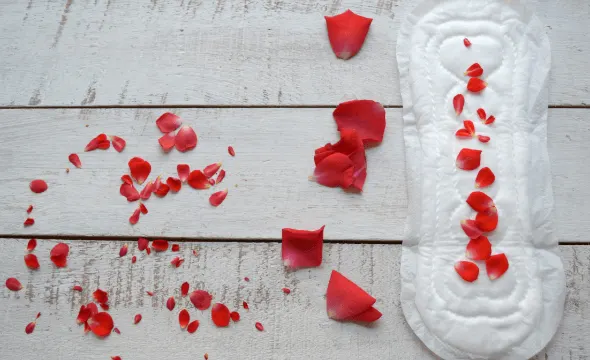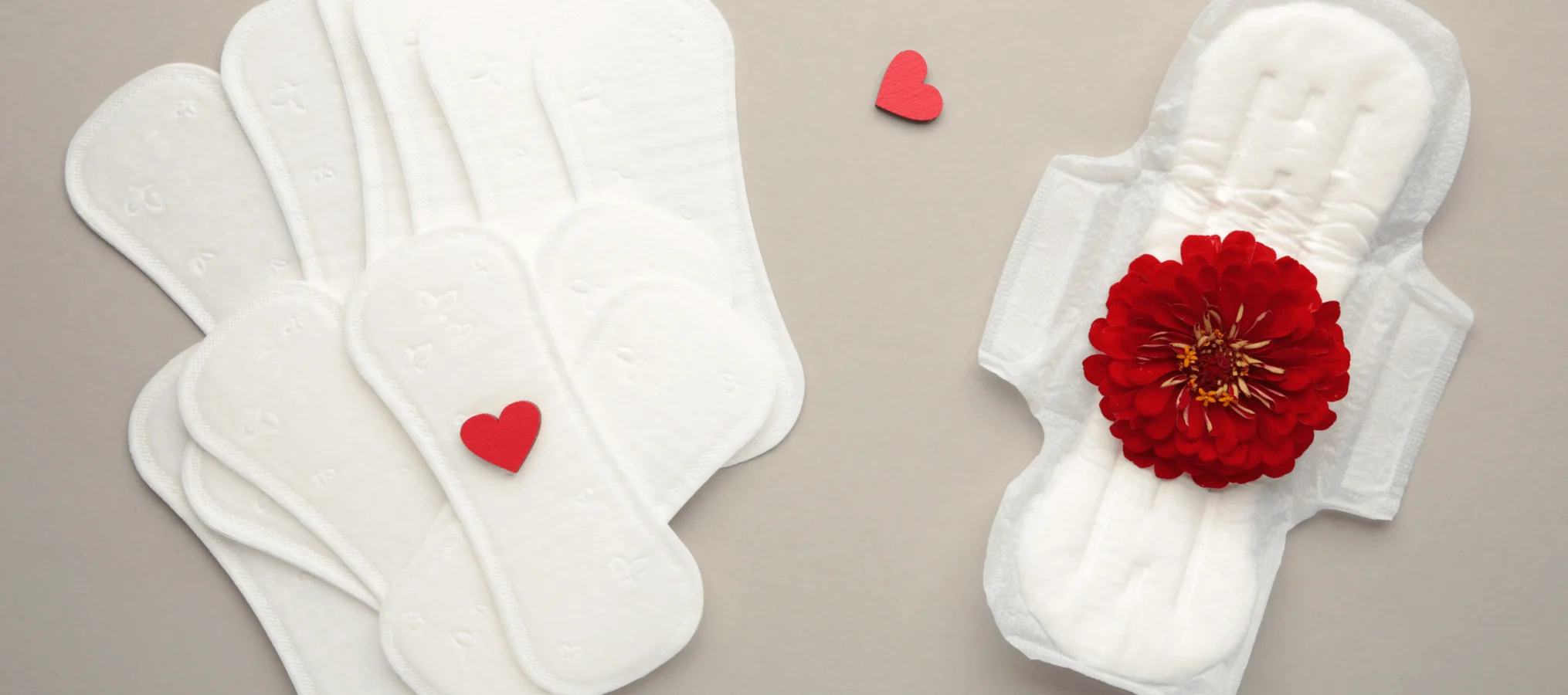Period Blood Clots: What’s Normal, Causes & When to Worry

Experiencing menstruation is a natural process and imperative when it comes to reproductive health and well-being. At times, period blood clots are a part and parcel of menstruation. If you want to maintain good health, you must be able to tell the difference between normal and abnormal period clots. In this article, you will learn about blood clots during menstruation in great detail.
- What Are Period Blood Clots?
- Normal Period Clots V/S Abnormal Period Clots
- What Causes Menstrual Blood Clots?
- What Are The Underlying Causes of Clotted Period Blood?
- How Are Period Blood Clots Diagnosed And Treated?
- What are the complications related to heavy periods & blood clots?
- How to Manage Heavy Periods and Blood Clots at Home
- Iron-rich Foods to Prevent Anaemia
- Home Remedies to Ease Symptoms
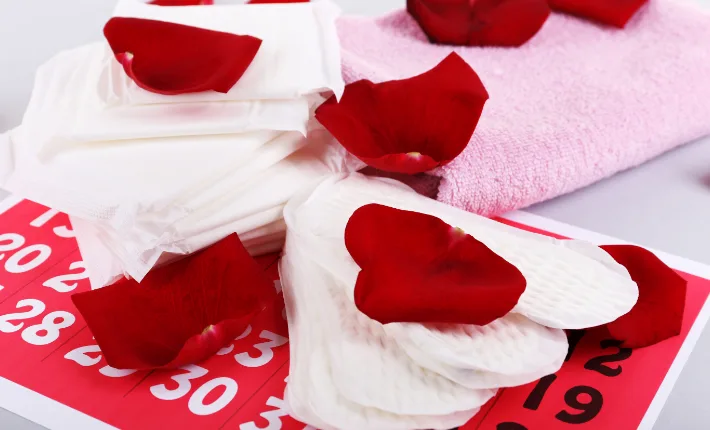

What Are Period Blood Clots?
Period blood clots are thick, jelly-like masses of menstrual blood, tissues, and lining that sometimes expel during menstruation . While many individuals might get alarmed seeing clots, it is essential to understand that not all period blood clots are a cause for concern.
Experiencing blood clots during periods is your body's natural defense mechanism for stopping excessive loss of blood. Typically, when you menstruate, the lining of your uterus sheds, and small blood vessels tend to bleed. But when there's an increased amount of bleeding, your body forms menstrual blood clots. This restricts your body from losing an excessive amount of blood. Likewise, clotted period blood occurs mostly when you have a heavy flow, primarily in the first two days of your periods. On the other hand, the consistency of these period clots varies from month to month. For instance, you might experience heavy periods with blood clots in a month while lighter flow with normal period blood in the other month.
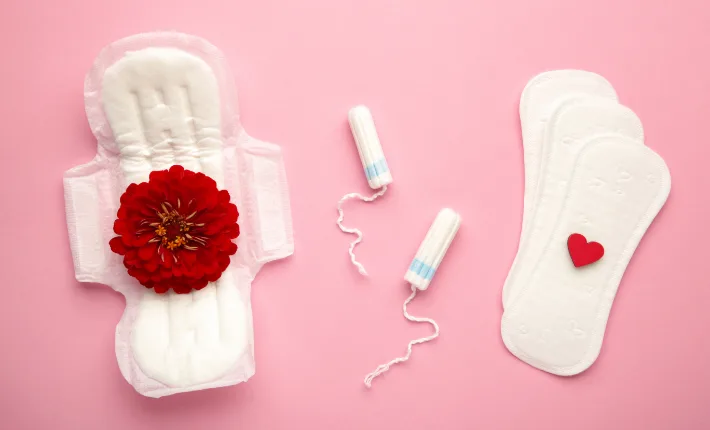

Differentiating Between Normal Period Clots V/S Abnormal Period Clots
Normal Period Blood Clots:
When we have our periods, our body has this cool trick where it releases anticoagulants to make sure everything flows nicely. But on those heavier flow days, things can move a bit too fast for this process. That's when you might spot some clots. Such clots, especially if they are smaller than a quarter in size, are typically considered normal.
Abnormal Period Clots:
If you consistently notice large clots or if your periods are heavier than usual, it might be indicative of a more significant concern. If the clots tend to be the size of a quarter and last longer than a day or two, it should be discussed with a healthcare professional. Moreover, heavy period flow leads to sanitary products needing changing by the hour, prolonged periods and menstrual cramps.
Here's how to distinguish normal period clots from abnormal ones:
| Normal period clots | Abnormal period clots |
|---|---|
| Normal-period blood clots are not bigger than the size of a coin. | Abnormal clots are bigger in size. |
| Normal period clots are bright or dark red in colour. | Abnormal period clots are almost black in colour. |
| Normal blood clots occur occasionally at the beginning of your cycle. | Abnormal blood clots occur frequently. |
In case you notice large clotted period blood and have frequent heavy bleeding, you should consult with your doctor immediately. In such a scenario, remember to use good quality sanitary pads that provide complete protection like the Always Maxi Thick Pads. They have an extra-absorbent core with a comfortable flexi pillow and dry top sheet which gives you comfort and protection in one go!


What Causes Menstrual Blood Clots?
As mentioned earlier, women of child-bearing age shed their uterine lining called endometrium, every 28 to 35 days. This shredded lining gets mixed with tissue, blood and mucus. When this happens, there are proteins released by the body which coagulate the blood present in the uterus. This prevents the uterine lining from bleeding further. As the coagulated blood pools in the uterus, it starts to clump up and causes menstrual blood clots.
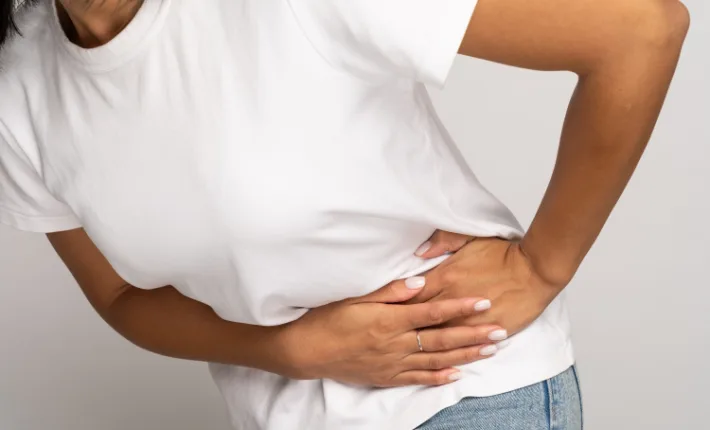

What Are The Underlying Causes of Clotted Period Blood
Menstrual blood clots can be concerning for many women, but understanding the root causes can provide clarity. These clots can stem from both natural processes and more severe underlying conditions:
1. Endometriosis
Endometriosis occurs when the endometrial tissue, usually lining the uterus's interior, starts to develop externally. This condition can result in discomfort during menstruation, increased bleeding, and visible clots in menstrual fluid.
2. Adenomyosis
Adenomyosis is characterised by the expansion of the endometrial tissue into the uterus' muscular layers. This penetration can result in an enlarged uterus, heavy menstrual bleeding, and larger clots. The condition can cause discomfort and cramping along with these symptoms.
3. Pregnancy Loss:
A miscarriage or pregnancy loss can be an unfortunate cause behind the presence of blood clots in the menstrual flow. Along with heavy bleeding, blood clots are one of the noticeable symptoms of a miscarriage, signalling the expulsion of the fetal tissue.
4. Hormonal Imbalances:
When hormones like estrogen and progesterone go out of sync you might experience unpredictable periods, more bleeding, and blood clots. Conditions like menopause, polycystic ovary syndrome (PCOS), and hypothyroidism can shed your uterine lining irregularly and lead to blood clots during periods of pain.
5. Age:
As women get closer to menopause, age also brings changes to our periods. It's not unusual for periods to get heavier, and sometimes, that means more blood clots.
6. Medications:
Just like how some foods can change how we feel, certain medications, especially those that affect our hormones, might give us a different menstrual flow than we're used to. For instance, blood thinners might increase the risk of heavy periods and subsequently, the formation of larger clots.
7. Von Willebrand Disease:
A genetic disorder, Von Willebrand disease affects blood clotting. Women with this condition might experience heavy periods with blood clots. The disease hinders the blood's ability to clot, leading to prolonged bleeding.
8. Uterine Obstructions:
Fibroids or polyps are non-cancerous growths in the uterus that can cause obstructions. They might lead to heavier periods and an increased occurrence of period clots. These obstructions can alter the way menstrual blood flows, contributing to clotting.


How Are Period Blood Clots Diagnosed And Treated-normal
If you are concerned about the consistency or volume of your period blood, it is essential to consult with your doctor. Diagnosis typically involves:
- A thorough physical examination helps the doctor understand the cause of clotted period blood.
- Blood tests can reveal hormonal imbalances or clotting disorders.
- An ultrasound can detect uterine obstructions, fibroids, or polyps.
Depending on the cause, treatment can range from hormonal medications to manage menstrual flow, surgical procedures to remove obstructions or lifestyle changes.
Always sanitary pads can be used to observe the type of period blood and gauge if the clotting is normal or abnormal. It's crucial to remember that while clots during a period might be concerning, understanding the distinction between normal period blood and abnormal clots is important.
Remember that period blood clots are a normal part of your reproductive cycle. Unless you experience large menstrual clots with heavy bleeding there's nothing to be worried about.
Understanding the nuances of our bodies is essential, especially when it comes to phenomena like period blood clots. Clotted period blood can be daunting, but with proper knowledge, you can distinguish between regular period clots and signs of potential health concerns. While it's natural to have occasional blood clots during periods, consistent heavy periods with blood clots warrant attention.
Read more about period symptoms , causes of irregular periods and what causes period pains.
Looking to manage your period cycle better? Our guide shares practical tips on how to make periods come faster that you can try today.
What are the complications related to heavy periods & blood clots?
Heavy menstrual bleeding, which also includes blood clots, can have numerous complications that could affect your health and quality of life in general. Blood clots during a period are common, more so on heavy menstrual days. However, if the clotting you experience is too excessive and your periods are heavy, then it can indicate underlying issues that could require medical care.
A complication that is associated with heavy periods and blood clots during menstruation is iron-deficiency anaemia. This condition occurs when the body loses more blood and iron than it is able to replenish. This leads to an array of symptoms such as fatigue, weakness, shortness of breath and dizziness. In many cases, anaemia can impact your daily activities and overall well-being.
Another concern pertaining to blood clots during periods is the disruption of regular activities. If you are experiencing this it could affect your day-to-day routine, which could inversely affect your work, education and social interaction. Having to constantly change your sanitary napkins or tampons constantly can lead to emotional distress and lower self-esteem.
If you experience significant blood clots during menstruation it may indicate you have a medical condition that needs addressing, such as endometriosis, uterine fibroids, or perhaps a bleeding disorder. These conditions may require further investigation and management by a healthcare professional.
Blood clots during periods can occur during a hormonal imbalance. Polycystic ovary syndrome (PCOS) and thyroid dysfunction can cause hormonal imbalance, which can lead to heavy bleeding and clot formation.
If you are experiencing troubling symptoms you must seek medical advice at once. A healthcare professional can provide a proper diagnosis and tailor a treatment plan that may include medication, lifestyle adjustments or in some cases, surgical interventions. It is important to monitor your cycle and stay alert to any changes in patterns for the sake of early detection.
How to Manage Heavy Periods and Blood Clots at Home
You can manage heavy periods and blood clots at home by resorting to a combination of lifestyle changes, dietary adjustments and home remedies aimed at alleviating symptoms and promoting overall well-being. If you experience significant blood clots during menstruation, the following strategies can help you cope more effectively.
Lifestyle Changes
1. Diet: If your diet is well-balanced, then it can help reduce heavy periods and blood clots. You can prioritise whole foods that are rich in various nutrients to help your body. Make sure to eat whole grains. Fruits and vegetables are included in your meals. Lean proteins are not to be ignored in daily meals, as they provide energy and help with hormonal balance.
2. Hydration: Make sure you are adequately hydrated when you are bleeding heavily. If you drink enough water throughout the day, then your blood volume can be maintained. Moreover. Reducing your caffeine and alcohol intake is important as it can contribute to dehydration.
3. Exercise: Regular physical activity can help your mange your emotional and physical symptoms of menstruation. Exercises like walking, swimming and yoga can improve your circulation and reduce cramps associated with heavy periods and blood clots.
Iron-rich Foods to Prevent Anaemia
Heavy periods can lead to iron-deficiency anaemia as there is persistent blood loss. So, if you eat iron-rich foods, then you can replenish your body’s iron stores and prevent fatigue.
1. Red meat: Foods such as red meat are a great source of iron.
2. Poultry and fish: Chicken, white meat and fish give you a healthy dose of iron and other nutrients.
3. Greens: Leafy greens such as spinach, kale, and Swiss chard are iron-rich and teeming with other vitamins.
4. Legumes: Beans, lentils and chickpeas are a worthy source suitable for vegetarians.
5. Nuts and seeds: Almonds and pumpkin seeds are great as they offer iron and healthy fats.
Lastly, oranges, tomatoes and strawberries are perfect for vitamin C and help with absorbing iron.
IronHome Remedies to Ease Symptoms
There are a number of home remedies that can come to your aid when it comes to discomfort associated with heavy periods and blood clots during menstruation:
1. Heat application: Make use of a heating pad or a hot water bottle on your lower abdomen to help relax the muscles and reducing cramps.
2. Herbal teas: You can happily sip on tea such as chamomile, ginger and peppermint so that it offers relief thanks to their anti-inflammatory properties.
3. Relaxation techniques: Activities like meditation, gentle yoga, or deep breathing exercises can help manage physical pain and emotional stress.
4. Comfortable attire: Your choice of clothing can minimise pressure and discomfort during your period.
If heavy flow and blood clots during periods persist, you must reach out to a doctor and explore treatment options available.
Disclaimer:
Please note the date of the last review or update on all articles. No content on this site, regardless of date, should ever be used as a substitute for direct medical advice, diagnosis or treatment from your doctor or other qualified clinician. Always is committed to ensuring that all of our products meet rigorous safety standards; Always Pads prioritizes the safety, protection and comfort of its consumers.





